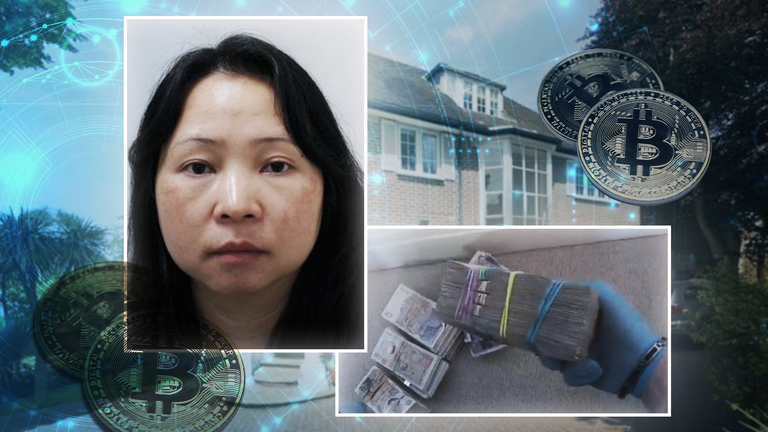A former Chinese takeaway worker found guilty of money laundering after police seized more than £3bn worth of Bitcoin has been jailed for more than six years.
Jian Wen, 42, came to the attention of police when she tried to buy some of London’s most expensive properties, including a £23.5m seven-bedroom Hampstead mansion with a swimming pool and a nearby £12.5m home with a cinema and gym.
The investigation led to the UK’s biggest-ever cryptocurrency seizure when more than 61,000 Bitcoin were discovered in digital wallets.
The cryptocurrency was worth £1.4bn at the time but its value has now risen to more than £3bn, while 23,308 Bitcoin, now worth more than £1bn, linked to the probe remains in circulation.
The Bitcoin allegedly came from a £5bn investment scam carried out in China between 2014 and 2017.
Wen was not involved in the fraud but was said to have acted as a “front person” to help disguise the source of the money, some of which had been used to buy cryptocurrency and smuggled out of China on laptops.
She was found guilty of one count of money laundering, relating to 150 Bitcoin, now worth nearly £8m, between October 2017 and January 2022 last month following a retrial at Southwark Crown Court.
Wen was jailed for six years and eight months today by Judge Sally-Ann Hales KC, who told her: “I am in no doubt you came to enjoy the better things in life.
“The evidence showed you and, to some extent, members of your family were generously rewarded for your service.”
The court heard Wen, who has been in custody as a Category A prisoner since 3 March 2022, plans to appeal the conviction.
Mark Harries KC, defending, said she “was a victim long before she became a criminal” and “was undoubtedly duped and used” by the alleged mastermind of the operation.
Mr Harries said she was “plucked from the most humble of backgrounds”, working and living in “shabby Chinese restaurants” into a “lifestyle of luxury” funded by the Bitcoin.
Wen lived in a £5m six-bedroom house rented for £17,000 a month near Hampstead Heath and travelled the world, spending tens of thousands of pounds on designer clothes and shoes in Harrods.
She drove a £25,000 E-Class Mercedes and sent her son to the £6,000-a-term Heathside preparatory school, the court heard.
She bought two apartments in Dubai for more than £500,000 and looked into buying a £10m 18th century Tuscan villa with a sea view.
But efforts to buy multimillion-pound properties in London triggered anti-money laundering checks and none of the purchases went ahead because the source of the Bitcoin could not be explained.
Wen, who had declared an income of just £5,979 in the 2016/17 financial year, could not explain the source of the funds and police first raided her home on 31 October 2018.
She accepted she was involved in an arrangement dealing with some of the cryptocurrency but said she did not know or suspect it was from the proceeds of crime.
The court heard that once the Bitcoin had been converted into fiat currency loaded on to black prepaid cards which could be used anywhere in the world.
Wen, who has a diploma in law and a business degree, was acquitted of a string of other money laundering charges and Mr Harries said she had wanted to make her and her son’s lives better, initially by legitimate means.
She was the “conduit”, with “her simple task the pressing of buttons for transactions of Bitcoin” and she had a “limited awareness of the extent of the criminal activity to which she had leant herself,” he said.
But prosecutor Gillian Jones KC said Wen was motivated by “greed” and her own “financial gain” not subjected to “coercion, intimidation or exploitation”.

